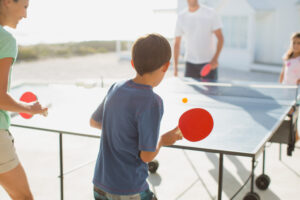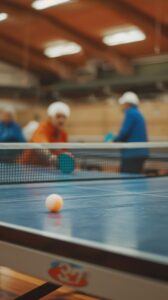My wife and I started to play ping pong in our backyard about five years ago. We quickly discovered how relaxing it was, even for 10-15 min. It is also social and every level of player grabs the paddle and can keep the ball in play. I have played ping pong since I was 8 years old. My father was a hard-working physician and wasn’t home much. But even when he was dead tired, he would play ping pong with his four children. It was one of our more enjoyable family activities.
About a year ago, we began to play doubles ping pong at our health club with eight other people. We play twice a week and have enjoyed getting to know the members of the group. What is nice at this stage of life, is that none of us care whether we win or lose and we laugh a lot. I was not aware of the health benefits of racket sports.1

The sports that have been extensively researched are table tennis, tennis, racquetball, and badminton. Overall they add about seven to nine years to your life with a significant improvement in cognitive function.2 Tennis seems to have the most impact but they all have similar benefits. I assume pickleball is in the mix but is a newer sport that I did not find a study on. Most of the data is in adults, but this one regarding young children caught my attention. Here is one quote.
It is concluded that longer tennis experience was associated with better performance in working memory and cognitive flexibility in children between the ages of 8 and 12. Furthermore, tennis experience is positively associated with executive functions. The results of the present study may be of great practical importance for parents and educational settings to design physical activity programs that target the improvement of cognitive function for children.3
Mental rigidity is a trait that is common to almost all mental health diagnoses.4 Notice they specifically comment on improving cognitive flexibility.
Summary
- Physical Health Benefits:
- Table tennis is a highly aerobic activity that improves cardiovascular health, coordination, and reflexes. Aerobic fitness is closely tied to longer life expectancy, with aerobic activities like table tennis typically contributing to a few extra years of life expectancy when played regularly.1
- Cognitive and Mental Benefits:
- Table tennis is especially noted for enhancing cognitive functions because it requires quick decision-making, hand-eye coordination, and fast reflexes. Studies on cognitive function and physical activity suggest that engaging in activities that combine physical and cognitive demands (like table tennis) can help prevent age-related cognitive decline, which is linked to overall longer life spans2.
- Comparisons to Tennis:
- Though specific data on life span increases from table tennis are sparse, it is possible that the life span benefit might be similar, though potentially slightly less than sports like tennis due to differences in intensity. In the Copenhagen City Heart Study, tennis was found to add an average of 9.7 years to life expectancy, largely because of its social and physical components.1 Table tennis shares many of these benefits, particularly the social and mental engagement, but it is generally considered lower-impact compared to tennis.
“The Abyss”
I am well-aware of hard and long you have tried to escape from your mental and physical pain. You have tried an endless array of different, often expensive treatments, and not only are you still suffering, you may be worse. Chronic illnesses are completely different than acute ones. Interventions that effectively decrease acute pain won’t work for chronic scenarios. A basic reason is that a chronic illness is complex and reqires a multi-pronged approach.
Exercise directly lowers stress chemistry and also increases the resiliency of the nervous system. Racket sports stimulate neuroplasticity of the nervous system by connecting with older and enjoyable learned neurological circuits and stimulates the formation of new ones. Social interaction releases oxytocin, which is a social bonding hormone. It also is highly anti-inflammatory.5 If you are older, especially if you are alone, find a way to engage in a racket sport. It is an easy way to meet people, and one author felt the benefits were enhanced with two or more people involved.

About 50% of parents in this modern era feel stressed.6 Almost every family I worked with that had a member suffering chronic pain was experiencing a lot of internal chaos. Stress increases pain, which in turn aggravates the internal dysfunction. Play is the antithesis of pain and creates a profound physiological shift from threat to safety, which heals. Why not take the time spent in conflict and head to the garage to play some ping pong?
Think of the time you have spent looking for answers. Ping pong is accessible to anyone at any age. It won’t solve your pain as an isolated intervention, but it is a significant low-risk step. 7
Marty Reisman was a legendary character and national champion 22 times. He felt he was still improving at 82 years old. Here is an interview. There is aslo a movie being produced about his remarkable and entertaining life.
There are two parts to healing:
Grab your paddle and let’s go!
References:
- Schnorr P, et al. Various Leisure-Time Physical Activities Associated With Widely Divergent Life Expectancies: The Copenhagen City Heart Study. (2018); 93: 1775-1785. doi: 10.1016/j.mayocp.2018.06.025.
- Oja P, et al. Br J Sports Med. (2017) 51:812-817. doi: 10.1136/bjsports-2016-096822.Epub 2016 Nov 28.
- Xu Y, Zhang W, Zhang H, Wang L, Luo Y and Ni G. Association between tennis training experience and executive function in children aged 8–12. Front. Hum. Neurosci. (2022) 16:924809. Doi: 10.3389/fnhum.2022.924809
- Giommi F, et al. The (in)flexible self: Psychopathology, mindfulness, and neuroscience. International Journal of Clinical and Health Psychology (2023); 23:100381. https://doi.org/10.1016/j.ijchp.2023.100381
- Carter SC. Sex, love, and oxytocin: Two metaphors and a molecule. 104948 Neuroscience and Biobehavioral Reviews 143 (2022) 104948. https://doi.org/10.1016/j.neubiorev.2022
- Murthy VC. Parents under Pressure: The U.S. Surgeon General’s Advisory on the Mental Health and Well-Being of Parents.
- Biz C, et al. Epidemiology and Risk Factors of Table-Tennis-Related Injuries: Findings from a Scoping Review of the Literature. Medicina (Kaunas). (2022); 58(5): 572. doi: 10.3390/medicina58050572
